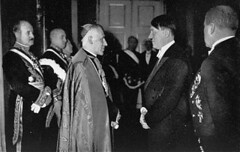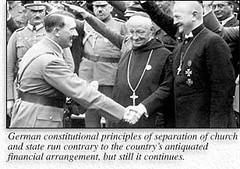Nazi Church

Adolf Hitler converses with the Catholic Pope's representative, Archbishop Cesare Orsenigo, at a New Year's reception in Berlin. (January 1, 1935).
"My feelings as a Christian points me to my Lord and Savior as a fighter."
--Adolf Hitler, in a speech on April 12th, 1922.
It goes without saying that only some Christians are fascists; that not all Christians are fascists; that a few Christians went so far as to oppose fascism, for example under the Nazis in Germany. A few openly opposed Hitler's plans even when threatened with punishment of death, as in the tragic case of the Christian intellectual, Dietrich Bonhoeffer. But it doesn't go without saying that most Christians in Germany willingly followed Hitler and supported the rise of the Nazis. And it doesn't go without saying that a substantial number of American Christians are now crypto-fascists as I began to suggest in a previous blog.
It bears repeating this history lesson here as nobody was taught it, (and I do apologize for the seeming cliche of having to drag in tired old Hitler yet again!). But we live in ahistorical times where the entire past is like some dark basement we've never wondered about, but rather papered over with childish myths and Hollywood fantasies; where "reality-based" is somehow wrongheaded; where people shake their heads in denial when confronted with facts; where ahistoric anachronism rules in vapid ignorance not only of the past but equally of our own present, about which few know anything at all worth knowing. So, off my pulpit and onto just the facts:
FuAQ: Frequently Un-Asked Questions: Answers, nevertheless, below:
*Hitler was a Christian who never tired of connecting his fascism with his religion, and the German Evangelical Church with his fascism.
*Hitler frequently quoted from and alluded to Biblical passages and to God's "providence"
(see source below).
*The conservative German church continued to be inspired since the Reformation by Martin Luther, who expressed violent anti-semitism repeatedly.
*Militant German nationalism was long expressed in terms of a "chosen people". E.g., the philosopher Fichte wrote that Germans were chosen "by God. . . with a moral right to fulfill our destiny by every means..." Later, the Third Reich was widely believed to be God's plan.
*Hitler stated that the Fuhrer was "infallible" just as the Pope was accepted to be infallible. He could do no wrong.
*In the 1930s, German children recited sayings and prayers that compared Hitler with Christ.
*The conservative Evangelical Church (most Germans) was then against modernism because it brought democracy, women's liberation, and experimental art, incomprehensible science, and cosmopolitan literature. In 1936, they cooperated with Nazi laws against homosexuality and abortion -- even when in 1941 suspects were sent to concentration camps to die.
*Hitler did threaten and forcibly remove any Christian pastor or Catholic priest who openly opposed him, however he did not have to remove very many since he enjoyed the consent of a majority.
*The Church's movement toward the far rightwing began well before Hitler, under the patriotic nationalism of the Federation for a German Church in the 1920s. Part of their movement was to establish a "Positive" theology that de-emphasized the Jewish roots of Christianity, instead emphasizing an ersatz christianity of nature, the Fatherland, and Folk rituals. Jesus would be seen as more "heroic". Their slogan: "One People, One God, One Nation, One Church." They welcomed the Nazis, one might say even prepared the way.
*(For those of you who are really too young to be reading this, yes, Jesus was a Jew. And yes, fascist slogans do sound suspiciously like current American fundamentalist slogans).
*Hitler in 1933 promised to protect the Catholic church and 5 days later, the Bishops of Germany officially supported Hitler. Nevertheless, the following year brought a wave of assassinations of Catholic priests by the notorious SS. Protestants didn't protest.
*The Evangelical Church preached a patriarchal gender division: women embodied Motherhood and sentiment, while men were "manly" christian warriors.
*The German theology was no longer about personal sin and salvation, but rather about the national life and death struggle against enemies: Jews and communists. The Bible was reinterpreted to support this theological change.
*1939, Hitler launches a preemptive attack on those enemies, now pretty much everyone who was not a German fascist. Most of the churches supported the war. 50% of pastors served in the military. 80% of the "Confessing Church" pastors swore an oath of allegiance to Hitler.
*By 1940, 35,000 sick patients had been killed after the Nazis started running "euthanasia" programs to kill off incurable patients and "abnormal" people. The Church hospitals did indeed resist operating these gas chambers and crematoria; but penalties for resistance were severe. Nevertheless, a key lesson is that when the Church did speak out openly against this, Hitler was forced to back down and halt the program. It led to new extermination camps being constructed "in secret" far away from towns.
*After Germany was defeated in WWII, the German Church refused to consider its own responsibility and support for fascism. Instead it insisted upon its helpless innocence.

Hitler blessed by the German church.
----------------------- -----------------
The January 6, 2005 edition of the New York Times ran an interview and profile of --
FRITZ STERN, a refugee from Hitler's Germany and a leading scholar of European history, startled several of his listeners when he warned in a speech about the danger posed in this country by the rise of the Christian right. In his address in November, just after he received a prize presented by the German foreign minister, he told his audience that Hitler saw himself as "the instrument of providence" and fused his "racial dogma with a Germanic Christianity."
"Some people recognized the moral perils of mixing religion and politics," he said of prewar Germany, "but many more were seduced by it. It was the pseudo-religious transfiguration of politics that largely ensured his success, notably in Protestant areas."
What I find interesting here as a sign of the times is that word "startled"! Fritz Stern was simply repeating the most basic and uncontroversial facts of Germany of some 70 years ago, but they were as startled as were the readers of the NY Times, which at least had the decency to follow through in the article to his conclusion for America of the present:
"The Jews in Central Europe welcomed the Russian Revolution," he said, "but it ended badly for them. The tacit alliance between the neo-cons and the Christian right is less easily understood. I can imagine a similarly disillusioning outcome."
----------------------- ---------------------
FURTHER SOURCES
The Christianity of Hitler revealed in his speeches and proclamations -- excerpts
Hitler's religious beliefs and fanaticism (Selected quotes from Mein Kampf)
1000 years of Christian barbarity -- illustrated chronology A bit simplified, but it's the simple stuff you were never taught in school.
The Catholic Church and the Holocaust: 1930-1965 by Michael Phayer Upshot: mixed record of silence, resistance, cooperation and fear.
Jesus Plus Nothing Jeffrey Sharlet went undercover to join a fascist christian brotherhood, The Family, that also runs a membership boarding house in Washington DC for Representatives of Congress and Senators. It is at 133 C Street S.E. This is the most hair-raising expose I've read in the past two years. The implications run deeply toward the irrational core of post-American macho-mystified politics. Sharlet is a writer to keep up with.
 The Gospel According to Dubya If you think there’s a disconnect between George W. Bush’s compassionate conservatism and his policies, just check out his savior.
The Gospel According to Dubya If you think there’s a disconnect between George W. Bush’s compassionate conservatism and his policies, just check out his savior.
You can also write to my genuinely nonfascist Christian friend in California at jleeman@ebold.com and ask him for a copy of his substantial essay on "The Sad Lesson of Hitler & The German Church". His essay taught me a lot about this. He doesn't agree with all of the above, of course, but that's because he's a Christian and I'm not. Only a true friendship can bridge such differences! His essay relies on historical scholarship by:
Barnett, Victoria. For the Soul of the People. Oxford University Press, 1992.
Barth, Karl. The German Church Conflict. John Knox Press, 1965.
Bergen, Doris L. Twisted Cross: The German Christian Movement in the Third Reich. University of North Carolina Press, 1996.
Cochrane, Arthur C. The Church's Confession Under Hitler. Westminster Press, 1962.
Conway, J.S. The Nazi Persecution of the Churches. Basic Books, 1968.
Gellately, Robert. Backing Hitler: Consent & Coercion in Nazi Germany. Oxford University Press, 2001.
Kershaw, Ian. The Hitler Myth. Oxford University Press, 2001.
Koch, H.W. In the Name of the Volk. St. Martin's Press, 1997.
Littell, Franklin H & Locke, Hubert G. Editors. The German Church Struggle & the Holocaust. Wayne State University Press, 1974.
Matheson, Peter. The Third Reich & the Christian Churches. T & T Clark Ltd, 1981.
Stern, J. P. Hitler: The Fuhrer & the People. University of California Press, 1975.
Waite, Robert G.L. Hitler: The Psychopathic God. Da Capo Pub, 1993.
-------------------



0 Comments:
Post a Comment
<< Home